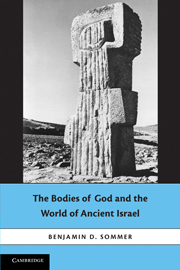Crossref Citations
This Book has been
cited by the following publications. This list is generated based on data provided by Crossref.
2009.
Books Received.
Harvard Theological Review,
Vol. 102,
Issue. 4,
p.
505.
2009.
Notices bibliographiques.
Revue des sciences philosophiques et théologiques,
Vol. Tome 93,
Issue. 4,
p.
935.
2012.
The Theology of the Book of Amos.
p.
181.
2013.
Divine Substitution.
p.
223.
Shonkoff, Sam Berrin
2013.
The Two Tablets: On Dissolving Ethical-Theological Dualism in Sacred Attunement.
The Journal of Religion,
Vol. 93,
Issue. 4,
p.
434.
Castelli, Elizabeth A.
2013.
The Cambridge Companion to Ancient Mediterranean Religions.
p.
252.
Thiessen, Matthew
2013.
‘The Rock Was Christ’: The Fluidity of Christ’s Body in 1 Corinthians 10.4.
Journal for the Study of the New Testament,
Vol. 36,
Issue. 2,
p.
103.
Forth, Christopher E
2013.
The qualities of fat: Bodies, history, and materiality.
Journal of Material Culture,
Vol. 18,
Issue. 2,
p.
135.
2014.
Continuity and Discontinuity.
p.
239.
Schaper, Joachim
2014.
Continuity and Discontinuity.
p.
145.
Kim, Brittany
and
Trimm, Charlie
2014.
Yahweh the Dragon: Exploring a Neglected Biblical Metaphor for the Divine Warrior and the Translation of’Ap.
The Bible Translator,
Vol. 65,
Issue. 2,
p.
165.
Ophir, Adi
2015.
On Linking Machinery and Show.
differences,
Vol. 26,
Issue. 3,
p.
54.
Hundley, Michael B.
2015.
Divine Presence in Ancient Near Eastern Temples.
Religion Compass,
Vol. 9,
Issue. 7,
p.
203.
Lewis, Theodore J.
2015.
The Wiley Blackwell Companion to Ancient Israel.
p.
510.
Goshen-Gottstein, Alon
2016.
Same God, Other god.
p.
173.
2016.
Menschenverständnis und Gottesverständnis im Alten Testament.
p.
315.
van Wolde, Ellen
2016.
The Challenge of Chance.
p.
131.
Zevit, Ziony
2017.
Max Weber's <I>Economic Ethic of the World Religions</I>.
p.
283.
Forger, Deborah
2018.
Divine Embodiment in Philo of Alexandria.
Journal for the Study of Judaism,
Vol. 49,
Issue. 2,
p.
223.
Cho, Paul K.-K.
2019.
Myth, History, and Metaphor in the Hebrew Bible.





